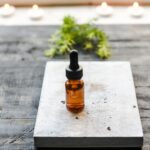Bergamot essential oil has gained immense popularity in the world of aromatherapy and skincare. Known for its refreshing and uplifting scent, bergamot essential oil is derived from the peel of the bergamot fruit. It is widely used for its numerous health benefits and therapeutic properties. In this article, we will explore the various uses and benefits of bergamot essential oil, as well as provide tips on how to incorporate it into your daily routine.
What is Bergamot Essential Oil?
Bergamot essential oil is a type of essential oil that is extracted from the peel of the bergamot fruit, which is a citrus fruit that resembles a small orange. The extraction process involves cold-pressing the peel to obtain the oil. This method helps to preserve the natural properties and aroma of the oil.
The chemical composition of bergamot essential oil includes compounds such as limonene, linalool, and alpha-pinene. These compounds contribute to its unique scent and therapeutic properties. Bergamot essential oil is known for its antiseptic, analgesic, and anti-inflammatory properties, making it a versatile oil for various health and wellness purposes.
The History of Bergamot Essential Oil
The bergamot fruit is believed to have originated in Southeast Asia and was later introduced to Europe by Christopher Columbus. It was primarily cultivated in Italy, particularly in the region of Calabria, where the climate and soil conditions are ideal for its growth.
Bergamot essential oil has a long history of use in traditional medicine and perfumery. In traditional medicine, it was used to treat various ailments such as digestive issues, skin infections, and respiratory problems. In perfumery, bergamot essential oil was highly valued for its fresh and citrusy scent, often used as a top note in fragrances.
Benefits of Bergamot Essential Oil for Health and Wellness
Bergamot essential oil offers a wide range of health benefits due to its chemical composition and therapeutic properties. Here are some of the key benefits of using bergamot essential oil:
1. Anti-inflammatory and analgesic properties: Bergamot essential oil has anti-inflammatory properties that can help reduce inflammation and pain. It can be used topically to alleviate muscle aches, joint pain, and headaches.
2. Antimicrobial and antifungal effects: Bergamot essential oil has natural antimicrobial and antifungal properties, making it effective in fighting against bacteria and fungi. It can be used to treat skin infections, acne, and fungal infections.
3. Immune system support and stress relief: Bergamot essential oil has immune-boosting properties that can help strengthen the immune system. It also has a calming and uplifting effect on the mind, making it an excellent oil for stress relief and relaxation.
How to Use Bergamot Essential Oil for Aromatherapy
Bergamot essential oil is commonly used in aromatherapy due to its pleasant scent and therapeutic benefits. There are several ways to use bergamot essential oil for aromatherapy:
1. Diffusion: Add a few drops of bergamot essential oil to a diffuser or humidifier to fill the room with its refreshing aroma. This method is great for creating a calming and uplifting atmosphere.
2. Inhalation: Add a few drops of bergamot essential oil to a bowl of hot water and inhale the steam. This method can help relieve congestion and promote respiratory health.
3. Massage: Dilute bergamot essential oil with a carrier oil such as jojoba or coconut oil and use it for a relaxing massage. This method can help relieve muscle tension and promote relaxation.
When using bergamot essential oil for aromatherapy, it is important to follow proper dilution guidelines and use it in moderation to avoid any adverse reactions.
Bergamot Essential Oil for Skincare: How it Works
Bergamot essential oil offers numerous benefits for skin health and can be incorporated into your skincare routine. Here are some of the ways bergamot essential oil can benefit your skin:
1. Antiseptic properties: Bergamot essential oil has natural antiseptic properties that can help cleanse the skin and prevent bacterial growth. It can be used to treat acne, blemishes, and other skin infections.
2. Skin brightening: Bergamot essential oil has natural skin brightening properties that can help even out the skin tone and reduce the appearance of dark spots and hyperpigmentation.
3. Oil control: Bergamot essential oil has astringent properties that can help regulate sebum production and control excess oil on the skin. It is particularly beneficial for oily and acne-prone skin.
DIY skincare recipes using bergamot essential oil:
1. Acne spot treatment: Mix 2-3 drops of bergamot essential oil with a teaspoon of carrier oil such as jojoba or coconut oil. Apply the mixture directly to acne spots using a cotton swab.
2. Brightening face mask: Mix 1 tablespoon of bentonite clay with 2-3 drops of bergamot essential oil and enough water to form a paste. Apply the mask to your face and leave it on for 10-15 minutes before rinsing off.
Bergamot Essential Oil for Hair Care: Tips and Tricks
Bergamot essential oil can also be beneficial for hair and scalp health. Here are some of the ways bergamot essential oil can benefit your hair:
1. Scalp health: Bergamot essential oil has antiseptic properties that can help cleanse the scalp and prevent dandruff and scalp infections. It can also help balance sebum production and reduce scalp oiliness.
2. Hair growth: Bergamot essential oil can stimulate hair follicles and promote hair growth. It can be used in hair masks or added to your shampoo and conditioner.
DIY hair care recipes using bergamot essential oil:
1. Dandruff treatment: Mix 2-3 drops of bergamot essential oil with a tablespoon of carrier oil such as coconut or olive oil. Massage the mixture into your scalp and leave it on for 30 minutes before shampooing.
2. Hair growth serum: Mix 2-3 drops of bergamot essential oil with a tablespoon of castor oil. Apply the mixture to your scalp and massage it in for a few minutes. Leave it on overnight and wash it off in the morning.
Bergamot Essential Oil for Digestive Health: A Natural Remedy
Bergamot essential oil can be used as a natural remedy for digestive issues due to its digestive properties. Here are some of the ways bergamot essential oil can benefit your digestive health:
1. Relieves indigestion: Bergamot essential oil can help relieve indigestion, bloating, and stomach discomfort. It can be used topically by diluting it with a carrier oil and massaging it onto the abdomen.
2. Reduces nausea: Bergamot essential oil has a calming effect on the stomach and can help reduce nausea and vomiting. It can be inhaled or applied topically to alleviate symptoms.
How to use bergamot essential oil for digestive health:
1. Inhalation: Add a few drops of bergamot essential oil to a tissue or handkerchief and inhale deeply when experiencing digestive discomfort or nausea.
2. Topical application: Dilute 2-3 drops of bergamot essential oil with a carrier oil such as coconut or olive oil. Massage the mixture onto the abdomen in a clockwise motion to promote digestion.
Bergamot Essential Oil for Mood and Emotional Support
Bergamot essential oil is well-known for its mood-enhancing and emotional support properties. Here are some of the ways bergamot essential oil can benefit your mood and emotional wellbeing:
1. Calms anxiety and stress: Bergamot essential oil has a calming effect on the mind and can help reduce anxiety and stress. It can be used in aromatherapy or applied topically to promote relaxation.
2. Uplifts mood: Bergamot essential oil has a refreshing and uplifting scent that can help improve mood and boost energy levels. It can be diffused or inhaled directly from the bottle.
How to use bergamot essential oil for emotional support:
1. Diffusion: Add a few drops of bergamot essential oil to a diffuser or humidifier to create a calming and uplifting atmosphere.
2. Inhalation: Inhale bergamot essential oil directly from the bottle or add a few drops to a tissue or handkerchief and inhale deeply when feeling anxious or stressed.
Bergamot Essential Oil Safety Information and Precautions
While bergamot essential oil offers numerous benefits, it is important to use it safely and with caution. Here are some safety precautions to keep in mind when using bergamot essential oil:
1. Phototoxicity: Bergamot essential oil contains compounds that can cause photosensitivity when exposed to sunlight or UV rays. Avoid direct sunlight or tanning beds for at least 12 hours after applying bergamot essential oil topically.
2. Skin sensitivity: Some individuals may be sensitive to bergamot essential oil and may experience skin irritation or allergic reactions. It is recommended to perform a patch test before using bergamot essential oil topically.
3. Pregnancy and breastfeeding: It is best to consult with a healthcare professional before using bergamot essential oil during pregnancy or while breastfeeding.
Safe usage guidelines for bergamot essential oil:
– Always dilute bergamot essential oil with a carrier oil before applying it to the skin.
– Use bergamot essential oil in moderation and avoid excessive use.
– Store bergamot essential oil in a cool, dark place to preserve its potency and aroma.
How to Choose the Best Bergamot Essential Oil
When choosing bergamot essential oil, it is important to select a high-quality oil that is pure and free from additives or synthetic fragrances. Here are some factors to consider when choosing the best bergamot essential oil:
1. Source: Look for bergamot essential oil that is sourced from reputable suppliers who practice sustainable farming methods.
2. Purity: Ensure that the bergamot essential oil is 100% pure and free from any additives or fillers.
3. Quality: Look for bergamot essential oil that has been tested for quality and purity by third-party laboratories.
Recommended brands and sources for bergamot essential oil:
– Plant Therapy
– Aura Cacia
– Rocky Mountain Oils
Bergamot Essential Oil Recipes: DIY Blends and Formulas
Bergamot essential oil can be used in various DIY blends and formulas for different purposes. Here are some DIY recipes using bergamot essential oil:
1. Relaxing bath blend: Mix 5 drops of bergamot essential oil, 3 drops of lavender essential oil, and 2 drops of chamomile essential oil with 1 cup of Epsom salt. Add the mixture to a warm bath and soak for 20 minutes to promote relaxation.
2. Energizing diffuser blend: Add 3 drops of bergamot essential oil, 2 drops of peppermint essential oil, and 1 drop of rosemary essential oil to a diffuser. Diffuse the blend in the morning to boost energy and focus.
Tips for creating your own blends and formulas with bergamot essential oil:
– Start with a small amount of bergamot essential oil and gradually increase the concentration based on your preference.
– Experiment with different essential oils to create unique blends and formulas that suit your needs.
– Keep track of the recipes and blends that work best for you, so you can recreate them in the future.
Bergamot essential oil is a versatile oil that offers numerous benefits for health and wellness. From its anti-inflammatory and antimicrobial properties to its mood-enhancing and skin-brightening effects, bergamot essential oil can be incorporated into various aspects of your daily routine. Whether you use it for aromatherapy, skincare, hair care, digestive health, or emotional support, bergamot essential oil is a valuable addition to any natural health and wellness regimen. Remember to choose high-quality bergamot essential oil and use it safely and responsibly to reap its full benefits.



